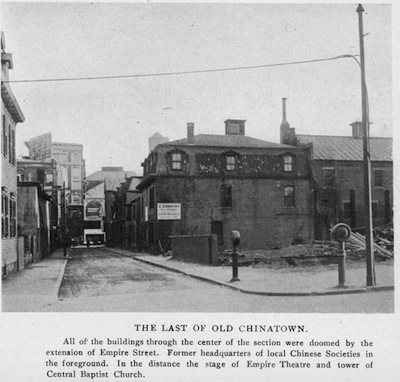
In the mid-1870s, there were only nine Asians total in Rhode Island, all of whom were Chinese men. It is easy – especially in 2022, when Asians account for 3.6% of Rhode Island’s total population (meaning there are approximately 39,500 Asians residing in the state) and are one of Rhode Island’s fastest-growing demographics – to forget the rich and robust history of Asian immigrants in Rhode Island. The state was home to at least two Chinatowns, one on Burrill Street and another on Broad Street, both of which were destroyed. Despite Asian immigrants making up a small percentage of Rhode Island’s total population, they were marginalized and faced discriminatory legislation.
Written descriptions of Chinese immigrants in The Providence Journal ranged from them having “quiet demeanor[s] and uniform behavior[s]” to them being “celestials” with “funny double-monosyllabic names.” Both descriptions stereotyped and exoticized the Asians residing in Providence, and the latter especially showed the lack of respect non-Asians had towards Asian immigrants’ names. In 1910, the Providence Business Directory listed Chinese laundries by their street names and phone numbers only, despite other businesses including the owner’s names as well. This was justified by the directory with the disclaimer that “Chinese names are not reliable.”
Another pervasive stereotype was that Chinese immigrants were gamblers and opium addicts. There was a movement in 1913 to remove Chinatown from Empire Street after six Chinese men were found with $12,000 of illegal opium. The justification from the police superintendent for removing Chinese people was that ”the appearance in any location of any considerable number of them means that gambling is going on” because “the Chinese are inveterate gamblers: the vice is inherent in the race.” Even a headline about the Chinese men’s arrest made fun of their accents, with it reading that the Chinese men were “brought to the ‘Melican [presumably the way Chinese immigrants said ‘American’] halls of justice.”
There were also multiple instances of discriminatory legislation in Rhode Island. In 1899, anti-Asian legislation attempting to block Chinese immigrants from applying for restaurant licenses was brought to the Providence Common Council. However, Providence’s police chief at the time asserted that the block was unnecessary because he intentionally held restaurant license applications from Chinese business owners for two to three months to strictly evaluate their characters. In addition, Providence law enforcement required Chinese restaurants to remove all doors and drapes so that the insides of their businesses were always visible after a Chinese man, William Leon, was suspected of murdering his romantic partner, a white woman named Elsie Sigel, in 1909. Police also advised teachers who taught Sunday school to Chinese immigrants to “be of an age and character as to make any such an occurrence as that […] impossible.”
While hate against Asians still persists in Rhode Island – Channavy Chhay, the Executive Director of the Center for Southeast Asians, reported that there has been an uptick in anti-Asian hate crimes in the state as a result of the COVID-19 pandemic – there has been more concrete legislation to support Asians and Asian Americans in the state. In 2017, Governor Gina Raimondo signed the All Students Count Act, which was championed by advocacy groups, the Alliance of Rhode Island Southeast Asians for Education and the Providence Youth Student Movement. The All Students Count Act mandated the disaggregation of information on Asian American students, meaning Asian American students had to be recorded as being part of specific ethnic groups instead of being grouped under a larger Asian American umbrella. This disaggregation is intended to make the academic disparities existing within the Asian American community more obvious: Despite Asians being portrayed as a ‘model minority’ in academic achievement, Southeast Asians have the highest dropout rate in the United States and nearly 40% of Hmong and Cambodian adults do not have a high school diploma. With this bill being signed into law, Rhode Island became the third state in the nation to pass the All Students Count Act. In 2022, Representative Barbara Ann Fenton-Fung introduced legislation that required all public primary and secondary schools in Rhode Island to teach Asian American, Native Hawaiian, and Pacific Islander (AANHPI) history, starting with the 2023-2024 school year. The bill passed both the House and Senate and is expected to be signed by current Governor Daniel McKee, which would make Rhode Island the fourth state in the nation to mandate AANHPI history in schools, joining New Jersey, Connecticut, and Illinois.
What I find most special about the latter bill is that it will affirm the importance of Asian and Asian American history. When there is so much history – especially right here in Rhode Island – it is essential that we recognize and understand the complex histories of Asians and Asian Americans so that their stories are not forgotten. As Representative Fenton-Fung said while advocating for the passing of the bill: “There’s a lot of amazing Asian Americans out there, but their stories don’t get told and they don’t become part of this big melting pot.”
This is one of many articles that will be featured in the AAC Journal, which will be released to members in September this year. You can learn more about Rachel here.
Sources
Fitzpatrick, Edward. “R.I. Asian American Population Grew by Nearly 28 Percent in the Past Decade.” BostonGlobe.com, The Boston Globe, 16 Aug. 2021, https://www.bostonglobe.com/2021/08/16/metro/ri-asian-american-population-grew-by-nearly-28-percent-past-decade.
Fitzpatrick, Edward. “R.I. Poised to Become Fourth State to Require Teaching Asian-American History.” BostonGlobe.com, The Boston Globe, 7 June 2022, https://www.bostonglobe.com/2022/06/07/metro/ri-poised-become-fourth-state-require-teaching-asian-american-history.
Fuchs, Chris. “Rhode Island Data Disaggregation Law Revives Debate Among Asian Americans.” NBCNews.com, NBCUniversal News Group, 27 July 2017, https://www.nbcnews.com/news/asian-america/rhode-island-data-disaggregation-law-revives-debate-among-asian-americans-n786986.
Gall, Mark. “‘Careless Chinese, These Empire Street Denizens!’ A Look at the Struggles of Providence’s Chinatown.” Small State Big History, The Online Review of Rhode Island History, 23 Nov. 2019, http://smallstatebighistory.com/careless-chinese-these-empire-street-denizens-a-look-at-the-struggles-of-providences-chinatown.
Jones, Chelsea. “‘Words Matter’: RI Sees Uptick in Hate Crimes against Asian Americans since Start of Pandemic.” WPRI.com, WPRI.com, 17 Mar. 2021, https://www.wpri.com/news/local-news/providence/words-matter-ri-sees-uptick-in-hate-crimes-against-asian-americans-since-start-of-pandemic.
Kelly, Grace. “Providence’s Lost Chinatowns.” Rhode Island Monthly, Rhode Island Monthly, 8 Feb. 2016, https://www.rimonthly.com/providences-lost-chinatowns.
LoSciuto, Shiina. “Lawmakers Pass Bill Requiring Schools to Teach Asian-American History.” WPRI.com, WPRI.com, 7 June 2022, https://www.wpri.com/news/education/lawmakers-pass-bill-requiring-schools-to-teach-asian-american-history.
Yam, Kimberly. “Rhode Island House Passes Act That Would Expose Asian-American Achievement Gap.” HuffPost, HuffPost, 29 June 2017, https://www.huffpost.com/entry/rhode-island-education-asian-americans_n_59526cb9e4b02734df2d7e06.






